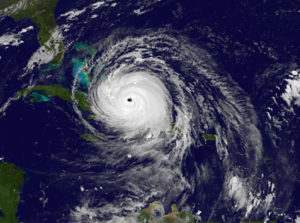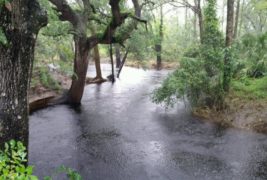What Irma Taught Us
Dell deChant
Remembering Donna
I was six years old in 1960 when hurricane Donna scared the dickens out of me. Irma followed a similar path, and I suspect it was just as scary to six-year-olds today as Donna was to me in our little house on Beach Drive in St. Petersburg. That house, built in the 1920s, less than a quarter mile from Tampa Bay, had wood-frame crank windows and no insulation. Donna’s winds kept pushing and pulling those windows back and forth in their frames. Trees fell near by, a power pole blew over in our alley, I watched the live wires lash about in the alley like an angry snakes, spewing red and white electric bursts in all directions. I will never forget how loud it was to my little ears. I cried. I thought we might all die. The house is long gone – done in, not by Donna, but by development.

I opened the door of my house in New Port Richey in the midst of Irma, and the sound brought back memories of Donna. Pretty scary – and we were lucky here. Donna revealed, first-hand, the power of hurricanes to many Floridians in my generation, and although some of what we learned from Donna is similar to what Irma taught us, Irma brought entirely new teachings for Florida and the world, which are as different from what they were in 1960 as I am from the little boy who thought he was about perish that terrifying night when Donna passed over the state.
Check out Donna’s path and the short narrative.
https://fcit.usf.edu/florida/maps/pages/12300/f12340/f12340.htm
http://www.tampabay.com/news/humaninterest/1960-hurricane-donna-forces-thousands-to-flee-from-coast/809217
http://www.hurricanescience.org/history/storms/1960s/donna/
Irma’s Basic Teachings
So, what did we learn from Irma? Quite a lot, I think; and much that may not make the quick news reports that inundate us at times like these. At a very basic level, we learned that when leaders tell folks to evacuate (especially including mandatory in their direction), they should be very clear that evacuation does not mean getting in a car, searching for gas, and driving to some vaguely perceived place of refuge – like Lakeland or Jacksonville. Rather, find a secure location, nearby, out of an evacuation zone. That’s enough. Consult family, neighbors, friends, folks across town. We don’t have to drive to North Carolina or get on a plane. We also learned that some leaders handled the crisis better than others. Those who were calm, clear, and direct were the most helpful. The alarmists with scary language, and too much macho (and often poor elocution) only complicated the decision-making process by ramping up the fear and anxiety – most likely leading some to unreflective flight and causing traffic jams from Marathon to Atlanta.
More Substantial Lessons
More substantially, we learned that leaders who have been outspoken in denying the reality of anthropogenic (human-caused) climate change seemed quite quick to accept the reality of a whole boatload of facts about hurricanes based on scientific findings not dissimilar to climate-change findings they rejected. The governor of Florida is good example. Here is a person who directed state agencies to remove the terms global warming and climate change from public documents. It is he, along with many elected leaders, who offered the famous “I’m not a scientist” evasion to perpetuate the false narrative that the scientific fact of anthropogenic climate change is not conclusive enough for government action. The rhetoric seems to work out something like this: Since I’m not a scientist I cannot challenge scientific findings, but since I do not accept the consequence of the reality they present, I’ll just take no action on the basis of those findings – content to let my lack of expertise cover the risky if not dangerous decision I have made.
On the other hand, this same governor, who still is not a scientist, readily and heartily accepted the findings of NOAA, NASA, the National Weather Service, the National Science Foundation, and a legion of scientists about the power, speed, direction, and destructive potential of a hurricane (a notoriously difficult phenomena to predict). Presumably, he had no clue about how those scientists came up with their models – but he certainly accepted their warnings. Rightly so, and to his merit, he mobilized all agencies of the state, called for federal assistance (from an administration equally committed to climate-change denial), called up the National Guard, went on TV and began warning everyone of the dire consequences of inaction in the face of this potentially devastating storm, and by all accounts did a good job of ramping up the level of fear and anxiety of citizens.
Hurricanes and Climate Change
So, at least in the case of this recent hurricane, one powerful government leader could suspend his rejection of scientific findings because he is not a scientist, and accept without reservation warnings offered by the scientific community. Imagine what could happen if he took the potentially catastrophic consequences anthropogenic climate change as seriously as he took the potentially catastrophic consequences of Hurricane Irma. Apparently, for this governor, the consequences of climate change are neither as dangerous nor as certain as the consequences of the largest hurricane ever recorded. We learned this from Irma. We also learned the “I’m-not-a-scientist” governor is no closer to being a scientist now than he ever was, but using that dodge as the basis to reject action on climate change doesn’t hold water today – not after his reaction to Irma.
Dell deChant is Associate Chair of the Department of Religious Studies at USF. He researches and teaches religion and ecology, is Chair of the Environmental Committee of the City of New Port Richey, a member of Florida Food Policy Council, and a member of the Board of Directors of Ecology Florida.


Leave a Reply